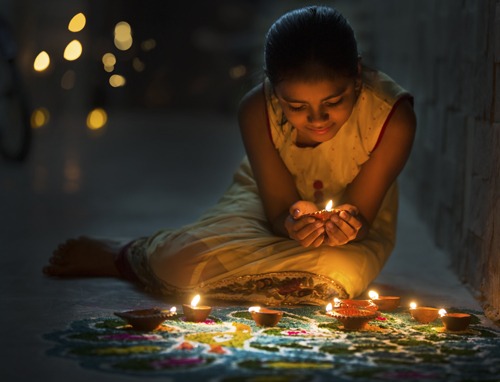Diwali is the second largest and the brightest festival to be celebrated in India after Durga Puja. It is an ancient festival to celebrate the triumph of light over dark and good over evil. The word ‘Diwali’ has been derived from the Sanskrit ‘Dipawali’ meaning ‘festival of lights’.
The significance of Diwali is evident even in the neighboring countries of India such as Nepal, Bangladesh, Malaysia, and among the Indian community people of U.K. In Leicester, more then 35,000 people from all over the western countries attend the city’s lighting ceremony.
This day of Diwali has different significance among different communities. Worshiping the goddess of wealth, Lakshmi, is a usual practice among all Hindu. Besides it marks the homecoming of the God Lord Ram after vanquishing the demon king Ravana. For Sikhs, Diwali insigne the release of Guru Hargobind Ji from imprisonment, for Jains the day marks the liberation of the soul from the cycle of death and rebirth and for Buddhists, the day marks the decision of Emperor Ashoka to embark on a path to peace. This day is even marked as the new year’s day of the Hindi Calender
There are other festive days adjoining the main day of Diwali. The main celebration initiates from Dhanteras (specific to some Northern and Western parts of India), the second day is known as Naraka Chaturdasi, Deepawali is celebrated on the third, the fourth day is called Diwali Padva (a day to honour married couples) and the fifth is known as Bhau-beej, a day to honour siblings.
As Lakshmi Puja falls on the no-moon day i.e. Amawasya, Kali Puja, is also being worshiped on this day by the Bengali community of eastern India. It is the second biggest festival in Kolkata and heralds the Diwali festivities. Soon after Vijayadashami, the Durga pandals in Kolkata are pulled down and preparations for the Kali pandals are made with amazing lighting, design and decorations.
On this festival of lights, the moonless night sky is decorated with fire-crackers and people decorate their homes with oiled lamps and electric rice lights. Some even play cards throughout the night as a symbol to welcome Goddess Lakshmi, the deity of wealth.
The entire occasion has a rejuvenating motif. It teaches every individual to wipe out all ‘evil’ within oneself and start afresh. So every one should take part in the spot of burning crackers keeping in mind the safety measures.














